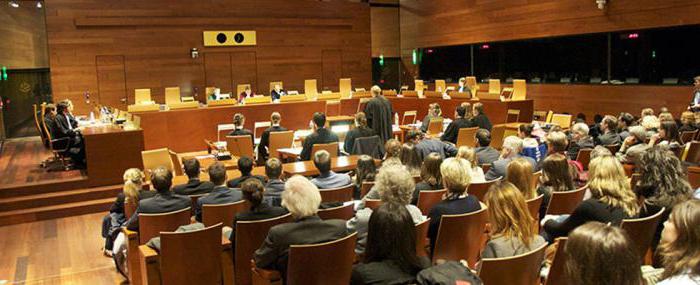Today, the implementation by inquiry officers and special bodies of inquiry of certain actions is regulated by means of the relevant norms of the CPC. Procedural timelines in criminal proceedings are the most important component of these standards. It will be advisable to consider the current issue in more detail. In addition, the reader has the opportunity in the process of familiarization with the materials of the article to learn all the features of such a category as the criminal process.
The concept and essence of the criminal process

The criminal process should be understood as the activity carried out by competent state bodies and officials, which is associated with the investigation and consideration of criminal cases and is based on the principles relating to criminal proceedings. It is important to add that this activity, one way or another, is regulated through the criminal procedure law. It is she who makes up the content of the criminal process considered in the chapter. For an absolute understanding of the picture, it would be advisable to note the main properties of the activity of criminal procedure.
Properties of criminal procedure
The concept and essence of the criminal process assume the following properties corresponding to this category:
- Criminal procedure activity is nothing but a type of state activity.
- Criminal procedure activities may be implemented exclusively by certain entities. They are specially authorized officials or government agencies. It must be added that public associations and individual citizens have the right to take part in it, as well as have an active influence on its course.
- Criminal procedural activity is developing in a certain form, clearly established by applicable law.
- Criminal procedure activities are endowed with unique tasks, which are discussed in the next chapter.
The objectives of the criminal process

So, the criminal process is nothing more than a form of state activity based on relevant principles and regulated by criminal procedure legislation. It is carried out in the form strictly defined by law by competent officials and state bodies, subject to the participation of public associations and citizens. What are tasks of the criminal process? It is important to know that the criminal process is aimed at protecting the legitimate interests and rights of organizations and individuals, as well as victims due to crimes, protecting the individual from unjustified and illegal conviction or accusation.
Task Implementation Tools
It must be understood that pre-trial proceedings and the implementation of the tasks given in the previous chapter, such keels otherwise involve the use of certain tools. To date, in practice, the following means of fulfilling the tasks of the criminal process are known:
- Criminal prosecution and further sentencing of quite fair punishment against those responsible.
- Refusal to prosecute the innocent and, of course, their release from the alleged punishment.
- Rehabilitation of those persons who have been unjustifiably prosecuted.
Term in criminal proceedings: concept and features

Having fully studied the criminal process as an independent category, it would be advisable to consider the procedural terms in the criminal process. In general, in terms of time it is necessary to understand a certain time period during which absolutely everyone involved in the criminal process performs procedural actions defined within the framework of the current legislation; make certain decisions; if necessary, refrain from committing certain operations. It is important to note that Articles 128 and 130 of the Code of Criminal Procedure of the Russian Federation contain all the detailed information regarding the fundamental rules for observing, restoring, calculating and extending terms in criminal proceedings. You need to know that the procedural time frames in criminal proceedings are usually calculated in months, days or hours. In the next chapter, it will be advisable to consider the rules for calculating deadlines in accordance with applicable law.
Actual calculation rules

Procedural timelines in criminal proceedings are calculated as follows:
- In the case of being placed under house arrest or in custody, or being in a medical or psychiatric dispensary, one way or another, the deadline will be included in the deadline.
- The term, calculated in days, in any case should end at exactly 24 hours of the final day.
- Rules of Procedure It is assumed that in the process of calculating the terms for months, under no circumstances are the days and hours from which the procedural period commenced taken into account.
- The term calculated in months, one way or another, must end on a certain date of the last month, which corresponds to the calculation. Then, when such a number is absent, the term shall be completed on the last day of the final month.
- Rules of Procedure imply that at the end of the period on a non-working day, the last working day is considered to be its last day.
Classification of dates
Having fully considered calculation of procedural terms, it would be appropriate to touch on the topic of their classification. Currently, deadlines are divided into three groups. The first of these includes terms that guarantee the speed of the criminal process.
Among them are the terms of inquiry (twenty days in accordance with the third part of Article 223), the terms of resolving the matter regarding the initiation of a criminal case (in accordance with the first and third parts of Article 144 of the RF Directorate of the Russian Federation), the investigation deadlines of a preliminary value (two months regarding the first part of Article 162), the deadline for the production of urgent investigative actions (ten days under part three of Article 157), the deadline for starting a case study in a court session (fourteen days from the moment the judge issued a decision on the appointment of a court hearing; in accordance with the criminal elami, which are considered the judicial authorities provided a jury, not later than thirty days on the first part of Article 233 of Code of Criminal Procedure).
Second group
In addition to the above, types of procedural terms include a grouping of periods that guarantee the legitimate interests and rights of participants in the process. Among them are the periods of detention and subsequent interrogation of suspects, the terms of application of certain preventive measures regarding suspects, the terms of bringing charges and the subsequent interrogation of defendants, the terms of detention of guilty persons, the time limits for considering complaints, and so on.
Third group
The concept of procedural terms It also implies the relevance of such a group as terms that guarantee the implementation of prosecutorial supervision of compliance with laws by the preliminary investigation and inquiry bodies. Among them are copies of decisions on the suspension or termination of the investigation, copies on the termination of the criminal case, the deadlines for sending messages to the prosecutor about the detention or search without the necessary court decision.
Ensuring the rights of participants

It is important to note that legal proceedings should be carried out in accordance with the provision of all the current rights of the participants, which also includes the competent formation of the procedural deadlines for the use of certain coercive measures.
Thus, law enforcement agencies are not entitled to detain a person if they suspect him of a specific crime, pending a decision by the judicial authorities for a period exceeding eight hours. This provision is spelled out in part three of article 94 and part three of article 128 of the Code of Criminal Procedure. It is important to know that the time frame for the terms in the current Russian legislation is not defined. Thus, in the case of newly discovered circumstances of the case or the appearance of new, relevant to the revision of the sentence of the prosecution, in favor of the convicted person, the time limits related to the review of the prosecution are not limited. This provision is regulated in the first part of Article 414 of the Code of Criminal Procedure.
What else?
Pre-trial proceedings assumes that state law enforcement agencies are obliged to clarify to all participants in criminal proceedings in need of norms regarding the relevant timelines. For example, the appeal appeal period must be clarified through the sentence on the basis of part three of Article 309 of the Code of Criminal Procedure.
If the procedural period is missed, which is not determined by any justifiable reasons, one way or another, it involves filing a petition, complaint or submission subject to incomplete consideration. It is necessary to supplement that legal proceedingscorresponding to this rule are regulated by the third part of Article 356 of the Code of Criminal Procedure. You need to know that today there is the possibility of extending the procedural period. However, such an operation is relevant only in the order and in those cases that are established through the Russian criminal law.
The importance of timelines in criminal proceedings

It is important to remember that timelines in criminal proceedings are endowed with critical importance. It can be conditionally noted that the determination of the terms is nothing but a plan for conducting a criminal case. Naturally, in this regard, there are also very “extended" stages. However, there are also quite limited ones that compensate for the general situation.
One way or another, a violation of the procedural deadlines can be regarded as a violation of current legislation. In addition, for delaying the process, which is unreasonable, its participants may be punished with compensation provided for by the current law. However, this is not the only measure related to liability.
What to do if the deadline is missed?
It is important to note that in practice, cases of missed deadlines are not always defined as critical. So, the Code of Criminal Procedure provides for two completely legitimate ways to “stretch” the deadlines. Among them are the following items:
- Recovery of the missed procedural term.
- Extension of the missed procedural term.
You need to know that each option can only become relevant in a particular situation. By the way, the second option has a negative connotation for the accused or suspect. It may be used in accordance with the following circumstances:
- Extension of detention of the accused.
- Extension of detention of the directly suspect.
- Extension of the investigation of preliminary significance.
The right to extend the specified terms is exclusively reserved for the judicial authorities, as well as the prosecutor's office (however, only in accordance with certain types of terms). It should be noted that the reasons for the extension, as a rule, relate to the importance and complexity of the case, conducting an investigation, collecting the necessary evidence, and also taking other procedural actions, according to which it is physically impossible to meet the “standard” deadlines.

Today, the opportunity to restore the term is provided for the reason that absolutely all interested parties are given the right to appeal against decisions and actions of the investigator or the investigator.In practical terms, situations from time to time are invested in which the person concerned does not have the opportunity to appeal the court verdict or the decision of the investigator exactly on time. For example, an investigator refuses to initiate a specific case relating to a specific person. However, the victim is fully confident that the crime was committed by that person. So, he intends to appeal the act of the investigator. Suddenly fate intervenes in the matter - and the victim needs an urgent operation, he ends up in the hospital. As you know, the rehabilitation period is very long. That is why victims cannot be lodged a complaint on time. Deadline has passed. You might think that this is where it all ends. However, in such a situation, the deadline corresponding to the appeal, one way or another, rests with restoration.